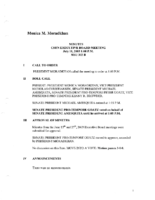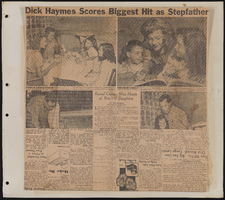Search the Special Collections and Archives Portal
Search Results
Allied Arts Council of Southern Nevada Records
Identifier
Abstract
The Allied Arts Council of Southern Nevada (AACSN) Records are comprised of the organizational records of the Allied Arts Council, a Las Vegas, Nevada-based non-profit organization that promoted the arts and cultural life in Southern Nevada from 1971 to 1999. Materials include meeting minutes, financial records, correspondence, membership information, publications, event information, project files, photographs, audio cassettes, VHS, and U-Matic tapes.
Archival Collection
Gary Sternberg Papers
Identifier
Abstract
The Gary Sternberg Papers are comprised of correspondence, publications, and videos documenting Sternberg's involvement with the Las Vegas Jewish community from 1983 to 2015. Organizations represented in the collection include Congregation Ner Tamid and the Holocaust Survivors Group of Southern Nevada. Also included are digital photographs of Sternberg in 2015 wearing his Caesars Palace dealer's uniform.
Archival Collection
Chris Giunchigliani Political Papers
Identifier
Abstract
The Chris Giunchigliani Political Papers (1986-2019) document Giunchigliani's career as a member of the Nevada Assembly as well as her involvement as a Clark County Commissioner. The majority of the collection is a "newspaper and document archive" which consists of media articles and newspaper clippings collected by Giunchigliani's office that mention Giunchigliani throughout her political career. The collection also includes campaign materials such as mailers and photographs. Interviews Giunchigliani did with local news networks in Las Vegas, Nevada as well as televised campaign advertisements for the Clark County Commission election are represented in the collection. Other materials include legislative research files for bills on gypsum reclamation, development near Red Rock Canyon, education reform, and funding to build an NFL stadium in Las Vegas. The collection also includes a certificate of commendation from Senator Harry Reid and thank you cards from schoolchildren.
Archival Collection

Transcript of interview with Midge Innis by James Thomas Griffin, May 8, 1976
Date
Archival Collection
Description
On May 8, 1976, James Thomas Griffin interviewed former casino dealer Midge Innis (born September 23rd, 1928 in Neligh, Nebraska) in her apartment in Las Vegas, Nevada about her life in Southern Nevada. The two discuss her occupational history as well as how she met her husband. The interview concludes Innis’ thoughts on environmental and social shifts in Las Vegas.
Text

Interview with Frankie Lou (Louise) Mayer, July 26, 2004
Date
Archival Collection
Description
Text

Interview with Brenda Adams Scruton, June 29, 2004
Date
Archival Collection
Description
Text

Interview with Frank Solaegui, December 1, 2004
Date
Archival Collection
Description
Text

Interview with Jerome Alexander Zawada, August 9, 2006
Date
Archival Collection
Description
Text

Meeting minutes for Consolidated Student Senate, University of Nevada, Las Vegas, July 11, 2003
Date
Archival Collection
Description
Text

